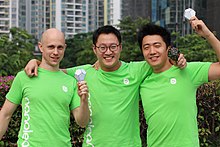Nanoleaf
This article has multiple issues. Please help improve it or discuss these issues on the talk page. (Learn how and when to remove these messages)
|
| Company type | Privately held |
|---|---|
| Industry | Consumer electronics |
| Founded | 2012 |
| Founder | Gimmy Chu, Tom Rodinger, Christian Yan |
| Headquarters | |
| Products | Smart Lighting & IoT Accessories |
Number of employees | 50 - 100 employees |
| Website | nanoleaf |
Nanoleaf is a consumer electronics company specialising in LED lighting.[1] The limited company was founded in 2012 by three engineers, and launched its first two products with crowdfunding campaigns on Kickstarter.[2]
History
[edit]Nanoleaf was founded in 2012 by three friends and University of Toronto engineering graduates Gimmy Chu, Christian Yan, and Tom Rodinger.[3] They were each working in different industries after graduation while creating Nanoleaf on the side and after a year, the three quit their jobs to develop the company full-time. [citation needed]
In January 2013, Nanoleaf launched their first product on Kickstarter.[4] The crowdfunding campaign for NanoLight (later renamed Nanoleaf One) received $250,000 from the crowdfunding site, with an initial goal of $20,000. Following the success of this campaign, Nanoleaf received funding from Horizons Ventures, an investment company owned by Li Ka Shing,[5] and Silicon Valley venture capital firm Kleiner Perkins.[6] The company also opened their first offices in Shenzhen, China, and Hong Kong.[7]
Their second Kickstarter campaign for the Nanoleaf Bloom in July 2014 generated $200,000 in funding with a goal of $20,000.[8]
Nanoleaf opened their Headquarters in Toronto, Canada, in January 2015. In 2017, the company launched in Europe and Australia. Their European office opened in Paris, France, in April 2018.[citation needed]
Technology
[edit]Nanoleaf uses LED lighting technology that encourages energy efficiency.[9][10][11][how?]

The company's initial product lineup included lightbulbs composed of small LEDs mounted on a folded circuit board, featuring an origami-like design. This technology eliminates the requirement for a heat sink, keeping the bulb cool to the touch, while also reducing the amount of energy required for manufacturing and extending its potential lifespan.[citation needed]
Nanoleaf introduced a new lighting technology with its smart modular light panels, first revealed at the 2016 Consumer Electronics Show.[12] The light panels, part of the company's 'Smarter Series' of products, have smart capabilities (via WiFi) including app and voice commands, music sync and touch controls. The light panels are made with LED chips on a printed circuit board and feature a diffuser on a flat surface.[citation needed][9]
In 2020, the Essentials line of smart Bulbs & Lightstrips launched and were Nanoleaf's first products using the Thread (network protocol), developed as a faster and more secure network connection for smart home products.[13] More recently, they announced a series of Bulbs & Lightstrips to the Essentials line that will work with Matter technology.[14][15] Matter is a smart home protocol aimed at unifying the different connected devices in your home for easier setup and daily use.[16]
Philanthropy
[edit]Masks
[edit]At the start of the COVID-19 pandemic in 2020 Nanoleaf pivoted their focus to creating and distributing masks to frontline workers to supplement the PPE shortage.[17][18] In total, they were able to donate over 600,000 masks to frontline workers and provide one million at a cost to other organizations in need.[citation needed]
Charitable Organizations
[edit]In December 2020, Nanoleaf collaborated with KultureCity,[19] a charitable organization that focuses on serving individuals with sensory needs, to create sensory rooms in public venues. These spaces are intended to serve as decompression areas for people with autism, PTSD, and other sensory sensitivities and needs. Nanoleaf provided the organization with their Canvas light panels, which were installed in the spaces to create soothing environments with gentle colors and light.[20] The first installation was built at the Georgia Aquarium, and both Nanoleaf and KultureCity have committed to creating additional rooms across the United States.[citation needed]
References
[edit]- ^ "Lighting a Revolution". University of Toronto Magazine. Retrieved 26 March 2015.
- ^ "Nanoleaf Bloom Dimming Bulbs Over $160,000 During Final Days on Kickstarter". crowdfundinsider.com. 3 September 2014. Retrieved 31 March 2015.
- ^ "Light of a New Age". www.design-engineering.com. Retrieved 26 March 2015.
- ^ "Toronto grads invent world's most energy-efficient bulb". Toronto Star. 1 January 2015.
- ^ "Li Ka-shing Heralds LEDs as Key to Future Economic Growth". ledinside.com. Retrieved 26 March 2015.
- ^ ""Asia's richest philanthropist," major Silicon Valley firm invest in alumni's Nanoleaf light bulb". Retrieved 26 March 2015.
- ^ "Hong Kong: Perfect Launchpad for Overseas Green Tech Startups". Forbes. Retrieved 26 March 2015.
- ^ "Nanoleaf Bloom Smart Lightbulb – Needs no App – No Dimmer". My Tech Report. Retrieved 21 February 2015.
- ^ a b Karcz, Anthony. "Nanoleaf Is Giving You Even More Smart Light Options". Forbes. Retrieved 2023-11-02.
- ^ Goldberg, Brianna (2013-02-06). "Alumni launch "world's most energy-efficient light bulb"". Retrieved 2024-07-26.
- ^ "Hong Kong start-up Nanoleaf has created the world's most energy-efficient light bulb". Retrieved 26 March 2015.
- ^ "The Smart LED Nanoleaf Aurora at CES 2016 - Design Milk". Design Milk. 2016-01-08. Retrieved 2016-12-06.
- ^ "Nanoleaf launches Apple-exclusive Essentials smart lights with HomeKit & Thread". AppleInsider. Retrieved 2023-01-16.
- ^ "Nanoleaf's new smart lights are the first specifically designed for Matter". The Ambient. 2022-11-03. Retrieved 2023-01-16.
- ^ Editor, Home Tech. "Nanoleaf is Matter-ready with its new Essentials lights". Tech Advisor. Retrieved 2023-01-16.
{{cite web}}:|last=has generic name (help) - ^ Hill, Simon. "Here's What the 'Matter' Smart Home Standard Is All About". Wired. ISSN 1059-1028. Retrieved 2023-01-16.
- ^ "Engineering alumni startup Nanoleaf to source more than one million masks amid COVID-19 shortages". U of T Engineering News. 2020-04-01. Retrieved 2021-02-05.
- ^ Chong, Barry (June 16, 2020). "This startup employee went from marketing lights to sourcing PPE for front-liners". MaRS Discovery District. Retrieved 2021-02-05.
- ^ "KultureCity - Making the nevers possible". KultureCity. Retrieved 2021-02-05.
- ^ "KultureCity and Georgia Aquarium Debut New Wilkins Rhodes Sensory". South Atlanta Moms. 2021-03-11. Retrieved 2021-07-18.
